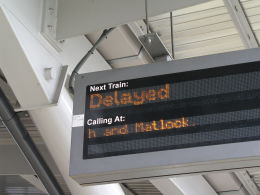Posted 30th May 2012 | 2 Comments
Network Rail is warned over late trains

THE OFFICE OF RAIL REGULATION has told Network Rail to improve the punctuality of long-distance passenger services, or face a 'substantial' penalty.
The ORR has predicted that Network Rail is set to breach its operating licence in the coming year, and now the regulator is preparing to issue an enforcement notice. It has conceded that levels of punctuality are 'good by historical standards', but goes on to point out that Network Rail is committed to doing better still.
An inquiry by the ORR revealed that Network Rail had 'struggled to cope' with the challenges of reaching its long distance punctuality target, although it is recognised that some factors are outside NR's control – particularly the growing menace of cable theft.
Nonetheless, the regulator is insisting that more can and must be done, having concluded that some of the problems have been 'of the company's own making', including problems with timetable planning and poor handling of equipment failures. It has ordered NR to provide fresh plans, drawn up in conjunction with operators, to keep more trains on time.
The ORR's chief executive Richard Price said: “Let me be clear – we expect Network Rail to hit targets, and to achieve this by implementing sustainable improvements that really benefit passengers. In the last year, approximately 13.7 million long distance journeys were affected by late or cancelled trains – and this is unacceptable. That is why we are proposing a penalty which puts pressure on Network Rail to achieve its funded target – an incentive for the company to do everything it can to deliver improvements.
“We will not allow Network Rail to rest at ‘good’ performance when the public have paid the company to achieve excellence. It is our duty as the regulator to push for improvements for passengers – and that is what we will do.”
The issue has been a fierce bone of contention for some time, and at least one intercity operator – East Coast – has been publicly critical of Network Rail's recent performance. After a series of bad delays in late March and early April last year, East Coast said: 'Infrastructure failures on the East Coast Main Line have been all too frequent of late – causing massive delays and inconvenience for our customers, and Network Rail has to improve its performance measurably.'
The ORR's new call for improvements has received backing both within and outside the industry. ATOC is in full support: its chief executive Michael Roberts said: "The big problem for long distance rail passengers is lack of consistency in train service punctuality and Network Rail needs to do a better job of managing the track and signals to resolve this.
“Network Rail must now focus on implementing the recovery plans prepared with the help of train companies, closely watched and challenged by the ORR. It is in Network Rail’s hands to reduce or even avoid the pain of any fine and we hope this will incentivise the right response.”
The Institute of Directors commented that reliable long distance train services were 'vital'. Its senior economic adviser Corin Taylor said: “The ORR is absolutely right to criticise Network Rail’s indefensible failure to meet its punctuality targets. Decent, reliable long distance rail services which arrive on time are vital to businesses in this country, and late-running, disrupted services are holding the economy back. Given the considerable funds contributed by taxpayers and customers, Network Rail has no excuse for providing a service which is anything short of excellent.”
Network Rail chief executive David Higgins responded to the ORR's warning by saying: "We welcome the ORR’s recognition that we, and the train operating companies, have already done much to improve long distance punctuality in this control period – which is currently running at a record level of 89.2 percent for the past year – and we accept the challenge to deliver an even better service.
"We are determined to do all we can to achieve that, through balancing the continued growth in demand with passengers’ desire for improved reliability.”
The issue is being complicated by calls for a tightening of the measurements of punctuality. At the moment, a long distance train which is less than ten minutes late at its final destination is considered to be on time, but watchdog Passenger Focus believes that this margin should be reduced, and that punctuality at intermediate stations should also be taken into account.
Reader Comments:
Views expressed in submitted comments are that of the author, and not necessarily shared by Railnews.

jak jaye, sutton
'Good by historical standards',what does that mean? just take a look daily at
the National Rail Website,day after day,there are massive delays involving signal failures,track faults broken down trains,its getting worse then it ever was under BR.
Lee, Bolton
It is understandable that Network Rail should be brought to task about the punctuality of long-distance train services, howevere what about shorter distance commuter services? Aren't commuters also paying for a high standard of reliability as well? Why is it that the DfT places so much emphasis on long-distance journeys at the expense of short distance commuter journeys which are far more prone to be ing delayed or cancelled and carry far more people on a daily basis?